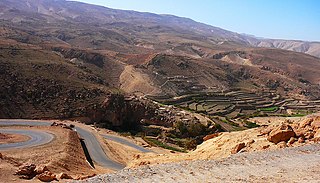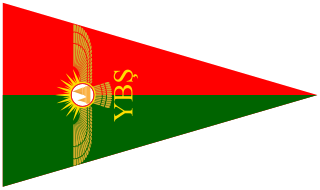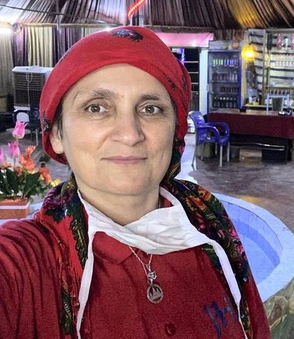Related Research Articles

Sinjar is a town in the Sinjar District of the Nineveh Governorate in northern Iraq. It is located about five kilometers south of the Sinjar Mountains. Its population in 2013 was estimated at 88,023, and is predominantly Yazidi.
The Barzani tribe is a Kurdish tribe and tribal confederation of various neighboring tribes inhabiting Barzan in Kurdistan Region of Iraq. The Barzanis are mostly Naqshbandi and one of the most influential tribes in Kurdistan.

Yazidis, also spelled Yezidis, are a Kurdish-speaking endogamous religious group indigenous to Kurdistan, a geographical region in Western Asia that includes parts of Iraq, Syria, Turkey, and Iran. The majority of Yazidis remaining in the Middle East today live in Iraq, primarily in the governorates of Nineveh and Duhok.

The Sinjar Mountains, are a 100-kilometre-long (62 mi) mountain range that runs east to west, rising above the surrounding alluvial steppe plains in northwestern Iraq to an elevation of 1,463 meters (4,800 ft). The highest segment of these mountains, about 75 km (47 mi) long, lies in the Nineveh Governorate. The western and lower segment of these mountains lies in Syria and is about 25 km (16 mi) long. The city of Sinjar is just south of the range. These mountains are regarded as sacred by the Yazidis.

Bashiqa is a town situated at the heart of the Nineveh plain, between Mosul and Sheikhan, on the edges of Mount Maqlub.

The Sinjar Resistance Units is a Yazidi militia formed in Iraq in 2007 to protect Yazidis in Iraq in the wake of attacks by Sunni Islamist insurgents. It is the second largest Yazidi militia, after the Êzîdxan Protection Force (HPÊ). However, it is much more active than the HPÊ in fighting against the Islamic State of Iraq and the Levant (ISIL).
The status of women in Iraq has been affected by wars, Islamic law, the Constitution of Iraq, cultural traditions, and secularism. Hundreds of thousands of Iraqi women are war widows, and Women's rights organizations struggle against harassment and intimidation while they work to promote improvements to women's status in the law, in education, the workplace, and many other spheres of Iraqi life. Abusive practices such as honor killings and forced marriages remain problematic.

The Sinjar massacre marked the beginning of the genocide of Yazidis by ISIL, the killing and abduction of thousands of Yazidi men, women and children. It took place in August 2014 in Sinjar city and Sinjar District in Iraq's Nineveh Governorate and was perpetrated by the Islamic State of Iraq and the Levant (ISIL). The massacre began with ISIL attacking and capturing Sinjar and neighboring towns on 3 August, during its Northern Iraq offensive.

The Women's Protection Units or Women's Defense Units is an all-female militia involved in the Syrian civil war. The YPJ is part of the Syrian Democratic Forces, the armed forces of Rojava, and is closely affiliated with the male-led YPG. While the YPJ is mainly made up of Kurds, it also includes women from other ethnic groups in Northern Syria.

Between 1968 and 2003, the ruling Arab Socialist Ba'ath Party of the Iraqi Republic perpetrated multiple campaigns of demographic engineering against the country's non-Arabs. While Arabs constitute the majority of Iraq's population as a whole, they are not the majority in parts of northern Iraq, and a minority in Iraqi Kurdistan. In an attempt to Arabize the north, the Iraqi government pursued a policy of ethnic cleansing, killing and forcefully displacing a large number of Iraqi minorities—predominantly Kurds, but also Turkmen, Yazidis, Assyrians, Shabaks and Armenians, among others—and subsequently allotting the cleared land to Arab settlers. In 1978 and 1979 alone, 600 Kurdish villages were burned down and around 200,000 Kurds were deported to other parts of Iraq.

The Protection Force of Êzîdxan (HPÊ), is a Yazidi military force founded by Haydar Shesho in the summer of 2014 in respond to the Sinjar massacre. It was bigger than the other main Yazidi militia who took part in the liberation of Sinjar from Islamic State, the Sinjar Resistance Units, which is aligned with the PKK-backed Kurdistan Communities Union.

The Êzîdxan Women's Units is a Yazidi all-women militia formed in Iraq in 2015 to protect the Yazidi community in the wake of attacks by the Islamic State of Iraq and the Levant and other Islamist groups that view Yazidis as pagan infidels.
Haydar Shesho is a Yazidi military commander in Iraq. He is the founder and supreme commander of the Yazidi self-defense militia Protection Force of Ezidkhan (HPÊ).

The Ezidkhan Command for Liberating Sinjar, known as the Sinjar Alliance, is a joint command of two–initially three–Yazidi militias, the Sinjar Resistance Units (YBŞ), and the Êzîdxan Women's Units (YJÊ). Both of the remaining two militias are supported by the Kurdistan Workers' Party (PKK).

Nadia Murad Basee Taha is an Iraqi-born Yazidi human rights activist based in Germany. In 2014, as part of the Yazidi genocide by the Islamic State, she was abducted from her hometown of Kocho in Iraq and much of her community was massacred. After losing most of her family, Murad was held as an Islamic State sex slave for three months, alongside thousands of other Yazidi women and girls.

The Yazidi genocide was perpetrated by the Islamic State in Iraq and Syria between 2014 and 2017. It was characterized by massacres, genocidal rape, and forced conversions to Islam. The Yazidis are a Kurdish-speaking people who are indigenous to Kurdistan who practice Yazidism, an Iranian religion derived from the Indo-Iranian tradition.

Yazda: Global Yazidi Organization, is a United States-based global Yazidi nonprofit, non-governmental organization (NGO) advocacy, aid, and relief organization. Yazda was established to support the Yazidi, especially in northern Iraq, specifically Sinjar and Nineveh Plain, and northeastern Syria, where the Yazidi community has, as part of a deliberate "military, economic, and political strategy," been the focus of a genocidal campaign by ISIL that included mass murder, the separation of families, forced religious conversions, forced marriages, sexual assault, physical assault, torture, kidnapping, and slavery.

The persecution of Yazidis has been ongoing since at least the 12th century. Yazidis are an endogamous and mostly Kurmanji-speaking minority, indigenous to Kurdistan. The Yazidi religion is regarded as "devil-worship" by Muslims and Islamists. Yazidis have been persecuted by the surrounding Muslims since the medieval ages, most notably by Safavids, Ottomans, neighbouring Muslim Arab and Kurdish tribes and principalities. After the 2014 Sinjar massacre of thousands of Yazidis by ISIL, which started the ethnic, cultural, and religious genocide of the Yazidis in Iraq, Yazidis still face discrimination from the Iraqi government and the Kurdistan Regional Government.

Nemam Ghafouri was an Iraqi-born Swedish Kurdish medical doctor and practitioner. She was known for helping Yazidi victims of Islamic State of Iraq and the Levant (ISIL).
The Kurdistan Region–PKK conflict is a series of battles and clashes in Iraqi Kurdistan between the ruling Kurdistan Regional Government against the Kurdistan Workers' Party (PKK) and its allied groups. It started in 1983 and is still ongoing in the form of an insurgency. The PKK's primary method is using guerrilla warfare against the Peshmerga.
References
- 1 2 3 Becker-Hicks, Harry (16 April 2014). "One woman's remarkable reflection on surviving genocide". The Daily Telegraph. Retrieved 16 November 2017.
- 1 2 Taban Shoresh (2015-02-11), BBC News Iraq conflict Yazidis in Sinjar cling on to aid flight - Taban Shoresh , retrieved 2018-09-19
- 1 2 "Taban Shoresh | HuffPost". www.huffingtonpost.com. Retrieved 2018-09-19.
- 1 2 3 "BBC World Service - Imprisoned By Saddam When I Was Four". www.bbc.co.uk. Retrieved 2018-09-19.
- ↑ HALABY, BUSHRA JUHI and JAMAL (2006-10-09). "Woman: Saddam Guards Buried People Alive". ISSN 0190-8286 . Retrieved 2018-09-19.
- 1 2 3 4 Corcoran, Kieran (16 November 2017). "This British-Iraqi woman quit her City job to help women enslaved by ISIS live normal lives again". Business Insider. Retrieved 16 November 2017.
- 1 2 Bagot, Martin (13 August 2014). "Iraqi who survived Saddam Hussein Kurdish genocide pleads for the thousands of trapped Yazidis". Daily Mirror. Retrieved 16 November 2017.
- ↑ Shoresh, Taban (2017-06-21). "#ProBonoWorkspace: A new home for The Lotus Flower". Huffington Post. Retrieved 2018-09-19.
- ↑ Days, Heritage Open. "25 Remarkable Women - One Extraordinary Festival | Heritage Open Days". www.heritageopendays.org.uk. Retrieved 2018-09-19.
- ↑ "'Parents Giving Thirsty Children Blood To Drink'". Sky News. 13 August 2014. Retrieved 16 November 2017.
- ↑ Lunn, Natasha (17 October 2016). "The Women Making Your World A Better Place". Red. Retrieved 16 November 2017.
- ↑ "No. 64269". The London Gazette (Supplement). 30 December 2023. p. N27.